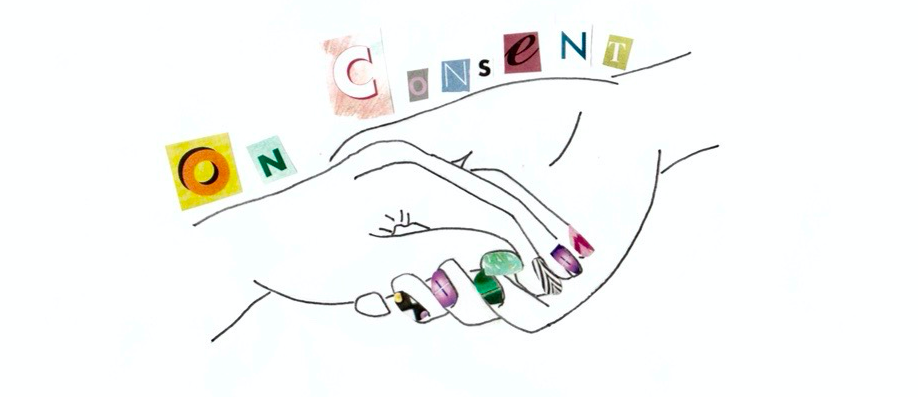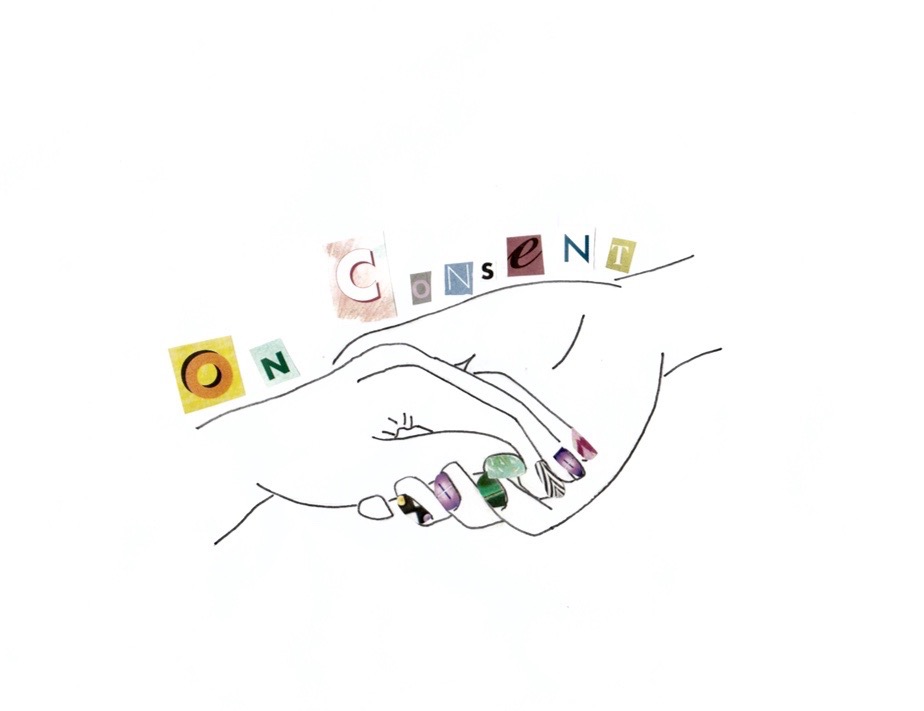'SEX WITHOUT CONSENT EQUALS RAPE': SARAH'S STORY
By Amie Tyrer

Illustration by Thea Elmsley
TW: Rape / sexual abuse
Hi Sarah, thank you so much for speaking to us today. Can we start with you telling
our readers a little about who you are?
I am a 22-year-old student at the University of Southampton, studying medicine. I am from Northern Ireland and live just south of Belfast. I am an 'outdoorsy' person, who loves sailing and does a lot of running.
Unfortunately, we are speaking to you today because you have gone through
something truly traumatic. You recently spoke openly about your experience of being raped by someone you knew and trusted in a video posted by Sexual Consent Awareness Southampton. How did you muster the courage to speak publicly about what happened to you and why did you feel it was important to share your story?
It took me a long time to get to a place where I was ready to share the video. The main reason why I thought it was important was it hopefully allowed for people who had experienced something similar to not feel alone. Statistics show that around two thirds of students and graduates have experienced sexual assault, however, it is rarely talked about at university. I went through therapy to understand my emotions regarding what happened to me and this gave me the confidence to not remain silent about it any more. My therapist helped me to remove any self blame that I had associated with the event and I was then able to talk about it without feeling shame.
I feel that part of my journey is to help others that have experienced sexual assault or rape and educate people on consent. This has allowed me to connect the horrible experience with a sense of purpose. I began highlighting the need for consent workshops to be involved in the university curriculum and working with my faculty to implement this for this coming September. I was then asked to share my experience as part of a campaign to raise awareness of sexual violence at university. I was terrified but I knew that it wouldn’t only empower other people to seek help, but it would also offer me closure from the entire experience. I wanted my peers to understand that the stories we hear are realities in a huge number of people’s lives. I knew the video would be an opportunity to tell my story in the way I wanted and illustrate to others how harmful behaviour that adds to rape culture is.
We are living in a world where women are starting to have the confidence to reclaim their voices and speak out against assault, violence and rape – did the recent phenomenon of the Me Too movement give you confidence to talk publicly about what happened to you?
The Me Too movement was a huge step forward for sexual violence survivors to be noticed by the media and it was the many stories that I had heard that helped me to share my own. I heard stories from people of all genders and identities who had experienced horrible violence against them. My heart broke each time because I knew exactly the pain that these people would have gone through. However, it absolutely helped me to identify as a survivor of sexual violence. There were particular media stories which were unfolding at the same time as I was moving from denial to acceptance of what had happened and I am sure if they were not there, this would have been a more delayed process for me. Seeing incredibly strong people on the news or on social media allowed me to relate to them and see the possibility of coming to terms with what happened.
In your video you spoke about the importance of understanding the term ‘consent’. The term seems difficult to define these days - what does consent mean to you and how do we start a discussion about the definition of this term more widely in society?
Consent, to me, is an active process of voluntary, mutual, enthusiastic and informed agreement. It is a fluid process that can be retracted and is communicated through both verbal and physical expression (but it’s important to note that body language alone doesn’t equate to consent). It ensures that all parties are happy with what is happening and allows for the experience to be enjoyed. It means there is no coercion, manipulation or persuasion. Sex without consent equals rape.
In terms of starting a discussion about consent more widely in society, I believe we must start with educating people at a young age, before they have been influenced by negative impressions (this could come from the media, porn or even friends and family). I believe consent must be a large part of school sex education. I am very hopeful that universities will begin to educate all students on sexual consent but I believe that it needs to begin before university. When someone enrols in university they have already learnt a huge amount from society about how to treat someone during a sexual experience. If we teach teenagers about sexual consent and the active process that is involved to ensure both parties are happy with the experience, I think there would be a huge shift in how sex is thought of in society.
‘You have to look at the way she was dressed, she was wearing a thong with a lace front’ - these are the words of Elizabeth O'Connell, a female judge who acquitted a 17 year old female’s rapist due to the underwear she was wearing. What do you say to
those people that still believe a woman’s clothing is a catalyst for rape?
Fundamentally, I believe this mindset has originated from the belief that women do not deserve sexual autonomy. Society used to believe, and some still do, that women should remain “pure” and wearing a “lace front” contradicts this. It adds to the belief that women do not, and should not, enjoy sex and the narrative that they should be a passive subject rather than an active participant. There are extreme examples of this, but I think it is all part of the same mentality. To people who believe this, I question whether they have any respect for women.
As mentioned before, in the wake of Me Too and Times Up it feels like we are living in a time where women and nonbinary people are harnessing their strength and fighting back against sexual offences, however, in 2018 London saw a 20% rise in rape reports in a year. Do you feel as though there is a way to reduce this number and if so, how do you feel it would be achieved?
I think it is important to remember that the idea that rape is equal to a man forcing himself on a woman is not always the case. The majority of victims of sexual violence are women,
however, this doesn’t take away from survivors who do not identify as female. In addition, it is not exclusively men who commit sexual violence. There are a lot more nuances that need to be involved in the conversation. For example, it is more common for males to experience emotional manipulation into sexual activities. I believe in order to reduce the number of people who experience sexual violence we need to have honest and open conversations regarding sexual consent, starting from teenage years. These conversations must be echoed from schools to universities and work places. There must be nationwide zero-tolerance policies and people in positions of power or influence must lead by example. People need to be held accountable for what they have done and victim shaming must become a thing of the past, if we are going to move forward. I believe we need to reassess the criminal justice system for sexual violence accusations in order to make the system more specialised to deal with these sorts of cases. Crucially, we must open our eyes to the problem.
It can be hard to know what a loved one to know what you need (emotionally and physically) in a traumatic time such as this. What advice would you give to friends and family of victims of sexual assault and rape?
Knowing and loving someone who goes through sexual violence is an incredibly difficult position to be in. There is nothing that can take away what happened and now all you can do is be there for the person who will be coming to terms with it themselves. Additionally, try to be there for yourself. There is no benefit in placing any blame on yourself for what happened or ever thinking that you failed to protect the person. It is often impossible to understand why this has happened to your loved one. I believe talking through the trauma is incredibly helpful for this. It is important to remember that they are still the same person and they will overcome it with your support. All you can do is be there for them and ensure they know that they are believed and supported.
How did you begin to come to terms with what had happened to you? Were there or are there any ‘coping mechanisms’ (for lack of a better term) that you used/use to remind yourself that it was not your fault and that you are strong enough to overcome this?
I have heard it been said, and I think it is absolutely true, that for someone to identify as a survivor of sexual violence, they must first identify as a victim. I spent a long time in complete denial about what had happened which, in some ways, was very easy. I never had to think about what had happened or feel any of the emotions connected to it. It wasn’t until a long time after it happened that I started to identify as a victim. This was definitely the most painful part but it was necessary in order to come to terms with what happened. It took me years to tell my closest friends and family what happened but this doesn’t mean they weren’t a support network for me. I have amazing people around me who are so strong and brave that they inspired me every day to continue to fight to overcome the trauma.
A huge part of my process was grieving the person that I was before the event and forgiving myself for being so cruel and unforgiving to myself at the time. I spent a huge amount of time reflecting on what I felt I needed to do in order to apologise to and forgive myself. I went through a range of emotions during my months of counselling, from extreme sorrow to rage, but I am now proud to be in a place where I feel at peace with myself and with the trauma. I think it is incredibly important that I do not hold onto any residual anger towards the person who did it. Not only is this harmful for my recovery, it is also damaging to the work in moving the conversation forward on to how we can improve the situation.
I am now working with a group of incredible people on a campaign called Not On My Campus UK. Our aim is to bring together people from across the United Kingdom to work to tackle sexual violence and to support survivors on UK campuses. We can be found on Facebook, Twitter and Instagram at NotOnMyCampusUK and appreciate any support for our campaign.
Art by
Words by
Share this article

